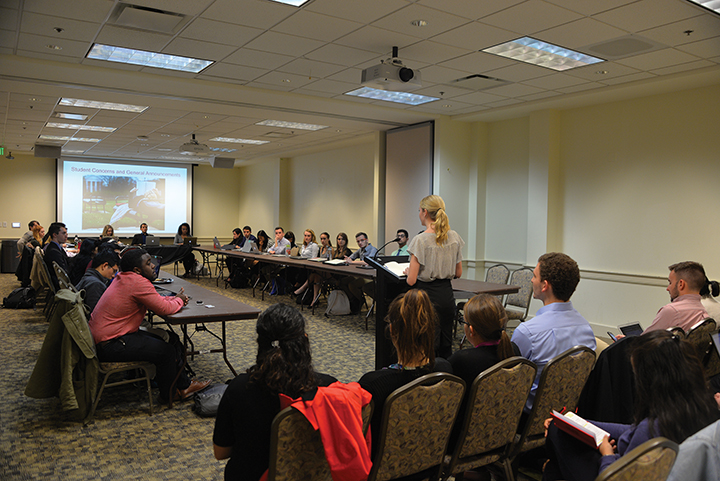The SGA voted unanimously Wednesday to support a proposal for a University Senate bill that would make it easier for students and faculty to accurately express their identities on official University of Maryland documents.
Luke Jensen, director of the Lesbian, Gay, Bisexual and Transgender Equity Center, first brought the proposal to the senate in August 2014 after he became aware of a discrepancy between student records and personnel records. Students’ legal names on personnel records override the nicknames they had chosen for class rosters, student ID cards and the university directory, Jensen said.
“The two systems don’t talk to each other,” he said. “So if a student didn’t know that, then all of a sudden their legal name would start popping up again because they got a job and the employer did not know they are using this other name.”
[Read more: After Trump’s announcement, a UMD official wants to codify protections for trans students]
He noted the bill was tabled in 2014 when other bills — most notably the call to update the sexual misconduct policy — became urgent.
If passed, this proposal aims to create uniformity between the student and personnel files. It would also eliminate discrepancies between “gender” and “sex” on identity forms, provide an “opt out” option for gender questions and give students the same ability employees have to update their primary name and other personal information, said Georgie Jones, the behavioral and social sciences college legislative co-sponsor.
Despite the stall, Jensen said he has been trying to bring the proposal back to the forefront. He has been working with the Student Government Association since Jones and the bill’s other co-sponsor, Mitchell Wilson, met with him last fall after reading a Diamondback article about a transgender engineering student who felt they could not attend class because of intolerance they faced, Wilson said.
While university employees are currently able to update personal information such as their name, gender, sex and honorifics through the Administrative Resources Enterprise Services portal, students have to fill out a paper form that is not widely accessible on the campus, said Jones, a junior government and politics major.
“The only places I know of that have the form are the LGBT Equity Center and the [International Students & Scholar Services] office,” Jones said. “The process is not well known, and it’s complicated.”
There have been student reports of language misuse in paper and online applications when asking identity questions, Jones said. The paper application that students fill out, for example, uses the term “gender” while online applications for employees use “sex,” though the terms are not synonymous, she said.
[Read more: SGA passes three resolutions urging for more gender-neutral bathrooms on campus]
The proposal is not just for transgender students, said Wilson, a junior English major. Any student who wants to change or update their name will benefit from it too, he said.
Jensen looked to other colleges and universities such as the University of Michigan and University of California to learn how they handle identity information that may be sensitive for certain students. UCLA handles applications by offering an “opt out” option for gender and sex questions, Jones said. Students at the University of Michigan are able to update their primary name as easily as changing their address.
“We’re smart people here,” Jensen said. “We should have something as simple as that.”
This university has been on Campus Pride’s “Best of the Best” Top 30 list of LGBT-friendly colleges and universities for the past five years. But Jones warned that if this school doesn’t continue being proactive about LGBT rights, it may not be recognized on the list in future years.
“Making sure that we can serve those communities now and later on to continue to stay on top is important to me, and it should be a top priority at the university as well,” Jones said.
Fasika Delessa, SGA vice president of academic affairs, said the SGA “thrives” when supporting policies or resolutions that may seem abstract or unimportant to some of the student community.
“When we support policies that protect vulnerable and sometimes invisible communities on campus, that is when we are at our best,” said Delessa, a junior business management major. “Those are the students who need our support the most.”



